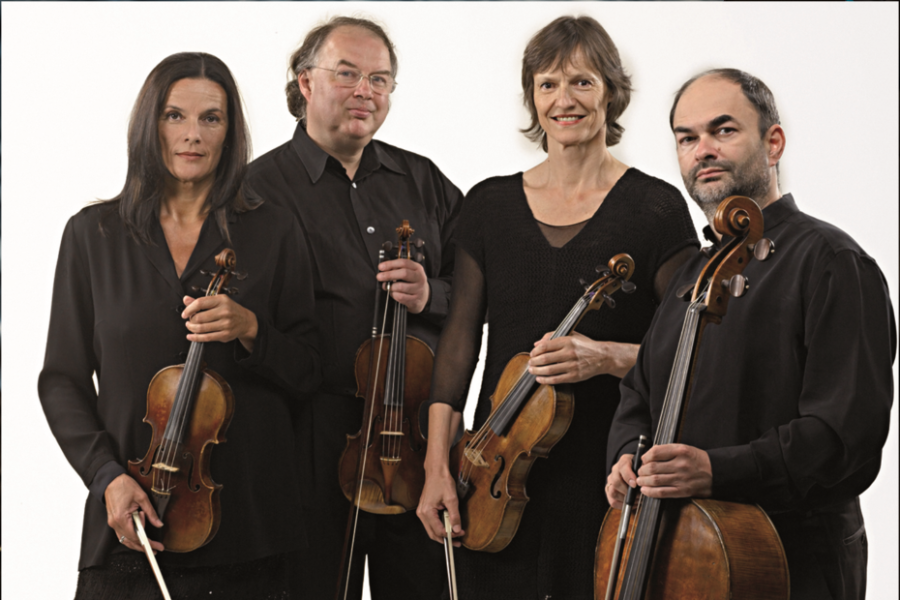Obecnie najbardziej znany kwartet smyczkowy grający na instrumentach historycznych; w sezonie 2017/18 obchodził 30. rocznicę powstania. Zwrócił na siebie uwagę nietypową decyzją o grze na strunach jelitowych, co w połączeniu z ogromną muzykalnością artystów wpłynęło na wyjątkowe brzmienie zespołu. Quatuor Mosaïques dużo koncertuje, zdobył wiele nagród i ma już znaczący dorobek fonograficzny. Założony w 1987 r., składa się z Austriaków: Ericha Höbartha (skrzypce), Andrei Bischof (skrzypce), Anity Mitterer (altówka), do których dołączył francuski wiolonczelista Christophe Coin.
Kwartet występował w Europie, Stanach Zjednoczonych, Australii, Japonii i regularnie koncertuje w Wiedniu, Londynie (Wigmore Hall), Amsterdamie (Concertgebouw) i Berlinie (Berliner Philharmonie). Często gości na prestiżowych festiwalach europejskich, m.in. w Edynburgu, Salzburgu, Lucernie, Bremie, Bath, Grazu (Styriarte), Schwarzenbergu (Schubertiade) i w Oslo. Zespół współpracuje z wieloma międzynarodowymi artystami, w tym z pianistami Andrásem Schiffem i Patrickiem Cohenem, klarnecistami Wolfgangiem Meyerem i Sabine Meyer oraz wiolonczelistami Miklósem Perényim i Raphaëlem Pidoux. W 2006 r. został zaproszony do Hiszpanii, by wystąpić dla króla Juana Carlosa I i zagrać na instrumentach Stradivariego z osobistej kolekcji króla.
Quatuor Mosaïques ma wyjątkowo obszerną dyskografię, obejmującą utwory Haydna, Mozarta, Arriagi, Boccheriniego, Jadina, Beethovena, Schuberta i Mendelssohna, a także kompozytorów współczesnych. Nagranie kwartetu Schuberta Śmierć i dziewczyna otrzymało znakomitą recenzję w „The Times”. Albumy z muzyką klasyków wiedeńskich zdobyły liczne nagrody, takie jak Diapason d’Or, Choc du Monde de la Musique i Gramophone Award. Z okazji swojego 30-lecia Quatuor Mosaïques wydał komplet późnych kwartetów Beethovena dla Naïve.
Czworo muzyków zespołu spotkało się w latach 80., kiedy występowali z Concentus Musicus Nikolausa Harnoncourta. Postanowili grać na instrumentach historycznych jako kwartet klasyczny. Nie ograniczają się jednak do dawnego repertuaru, ale sięgają po utwory z całej europejskiej tradycji kwartetu smyczkowego, stale poszerzając repertuar i starając się ukazywać psychologiczne podstawy muzyki.
Najnowsze wydarzenia w planach zespołu to występy w Royal Northern College of Music w Manchesterze, rezydencja w wiedeńskimKonzerthausie, m.in. w programie z sopranistką Ruby Hughes, powtórzonym także na festiwalu Concentus Moraviae w Czechach. W sezonie 2019/20 kwartet zagrał w amsterdamskim Concertgebouw, wykonał kwartety ze środkowego okresu twórczości Beethovena na Lammermuir Festival i kwartety z op. 59 podczas Kilkenny Arts Festival. Jesienią 2019 r. Quatuor Mosaïques nagrał nową płytę z kwartetami Beethovena ze środkowego okresu jego twórczości (Naïve).
__________
Quatuor Mosaïques is the most prominent period-instrument quartet performing today, celebrating their 30th anniversary in the 2017/18 season. The ensemble has garnered praise for its atypical decision to use gut-stringed instruments which, in combination with its celebrated musicianship, has cultivated the group’s unique sound. The Quartet has toured extensively, won numerous prizes and established a substantial discography. Formed in 1987, the group is comprised of Austrians Erich Höbarth (violin), Andrea Bischof, (violin), Anita Mitterer (viola), and the French cellist Christophe Coin. The Quartet has appeared in Europe, the United States, Australia, and Japan as well as regularly performs in Vienna, London’s Wigmore Hall, Amsterdam’s Concertgebouw, and Berliner Philharmonie. Quatuor Mosaïques often appears at prestigious European festivals such as Edinburgh, Salzburg, Luzern, Bremen, Bath, Styriarte Graz, Schubertiade Schwarzenberg, and Oslo, among others.
Quatuor Mosaïques has collaborated with many international artists including pianists András Schiff and Patrick Cohen, clarinettists Wolfgang Meyer and Sabine Meyer, and cellists Miklós Perényi and Raphaël Pidoux. In 2006, Quatuor Mosaïques was invited to Spain to perform for King Juan Carlos I, using the Monarch’s personal collection of Stradivari instruments. Quatuor Mosaïques has an extraordinarily extensive discography which includes works of Haydn, Mozart, Arriaga, Boccherini, Jadin, Beethoven, Schubert, and Mendelssohn as well as modern composers. The album with Schubert’s Der Tod und das Mädchen received an excellent review in The Times. Recordings of the Wiener Klassik repertoire have been awarded numerous prizes such as the Diapason d’Or, the Choc du Monde de la Musique, and a Gramophone Award. To coincide with their 30th anniversary, Quatuor Mosaïques released the complete Beethoven’s Late Quartets for Naïve. These four musicians met while performing with Nikolaus Harnoncourt’s Concentus Musicus in the 1980s, and decided to perform on original instruments as a classical ‘caper quartet’. Although the Quartet performs on period instruments, it embraces the European quartet tradition, constantly allowing for the evolution of its repertoire as it strives reveal the music’s psychological underpinnings.
Recent highlights include residencies at the Vienna Konzerthaus including a programme with soprano Ruby Hughes, and performances at Amsterdam’s Concertgebouw, Beethoven Middle Quartets at Lammermuir Festival and op. 59 quartets at Kilkenny Arts Festival. In Autumn 2019, the Quartet recorded a new disc of Beethoven’s Middle Quartets for Naïve Records.

